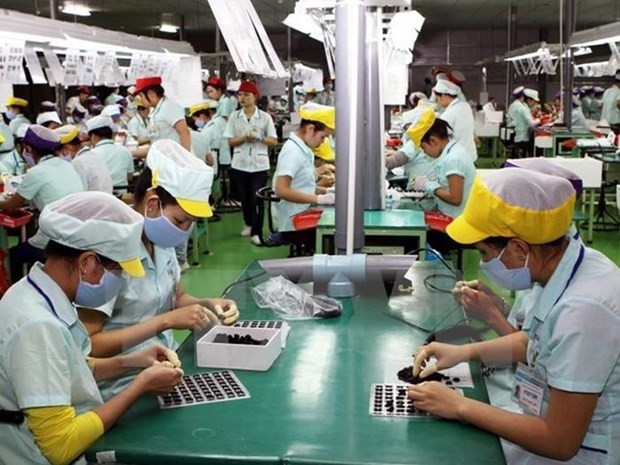 The cap on overtime working hours will be raised to 400 hours per year. Illustrative image (Photo: VNA)
The cap on overtime working hours will be raised to 400 hours per year. Illustrative image (Photo: VNA) Hanoi (VNA) – If the cap on overtime working hours is raised, enterprises will cut back on new recruitment, which will create pressure on job opportunities, experts said.
The Government has submitted to the National Assembly the draft revised Labour Code with many new regulations, including raising the cap on overtime to 400 hours a year from the current 300 hours.
Which sectors are eligible for the new maximum overtime working hours?
The raise of the cap on overtime is made in response to enterprises’ request and the need of a part of the working force. The new cap is set based on consideration of various factors concerning socio-economic situation, competitiveness of the labour market, investment attraction, enterprises’ needs, and workers’ needs in terms of economic reasons, health and wage.
However, the draft revised regulation specifies that the new maximum overtime working hours are only applied to certain occupations and at certain times such as peak times of orders. Enterprises have expressed their opinions that the regulation is still too tight for them.
Dao Thi Thu Huyen, representative of the Japanese Business Association in Vietnam, said the raise of the overtime cap suits enterprises’ business and production needs. She cited the example of those operating in information technology where research and development of products require long working time.
Huyen pointed to a fact that most enterprises engaging in subcontracting could apply for the maximum 300 hours of overtime a year. If the new regulation stipulates that the new cap is applied only for special sectors, the question is how to define those “special sectors”.
A representative of the American Chamber of Commerce in Vietnam (AmCham Vietnam) also agreed that the stipulation poses a problem of discrimination among enterprises.
Graduated rate needed to calculate overtime pay
According to the draft revised Labour Code, employers must pay workers higher for their overtime working hours. The pay must be at least 150 percent of the standard wage for overtime working hours on a normal working day, 200 percent for overtime working hours on weekends, and 300 percent for overtime working hours on public holidays.
The issue of overtime work must be considered based on various factors, from workers’ health, employment, labour safety and the legitimate interests and benefits of workers, in the context of the world trend of reducing working hours and increasing resting time.
Ngo Duy Hieu, Vice Chairman of the Vietnam General Confederation of Labour (VGCL), shared that from the trade union’s angle, the VGCL agreed to the raise of the overtime cap to 400 hours, but with sadness. The fact is workers’ income is still low, and many have to work overtime to feed their families.
Based on this, Hieu supported the stipulation that overtime pay should be calculated based on graduated rates.
Not all workers want to and are fit enough to work overtime continuously. When overtime working hours increase, workers’ income also goes up but at the same time it will make it easier for employers to pressure workers into working extra hours.
Le Dinh Quang, deputy director of the Department of Labour Relations under the VGCL, said calculating overtime pay on a graduated basis will make employers re-think when they want to ask workers to do overtime.
“Calculating overtime pay using graduated rates will prevent enterprises from paying low wages in order to make workers do overtime work, instead of recruiting more workers,” Quang said.
To address the negative effects of overtime work and ensure workers’ health, the draft revised Labour Code stipulates the voluntary principle, under which only when workers agree can enterprises mobilise them to work extra hours. Besides, the draft also requires that total working hours in a day, both normal and overtime, must not exceed 12 hours.-VNA





























